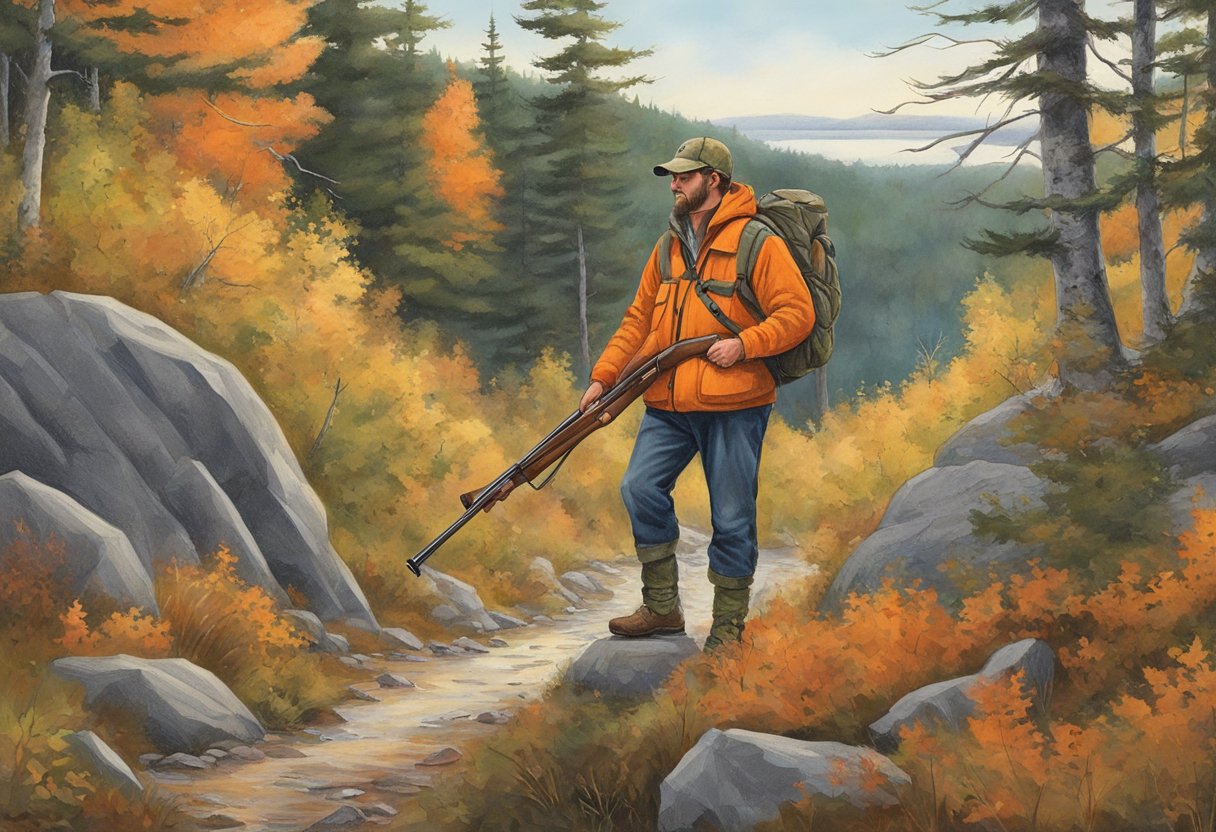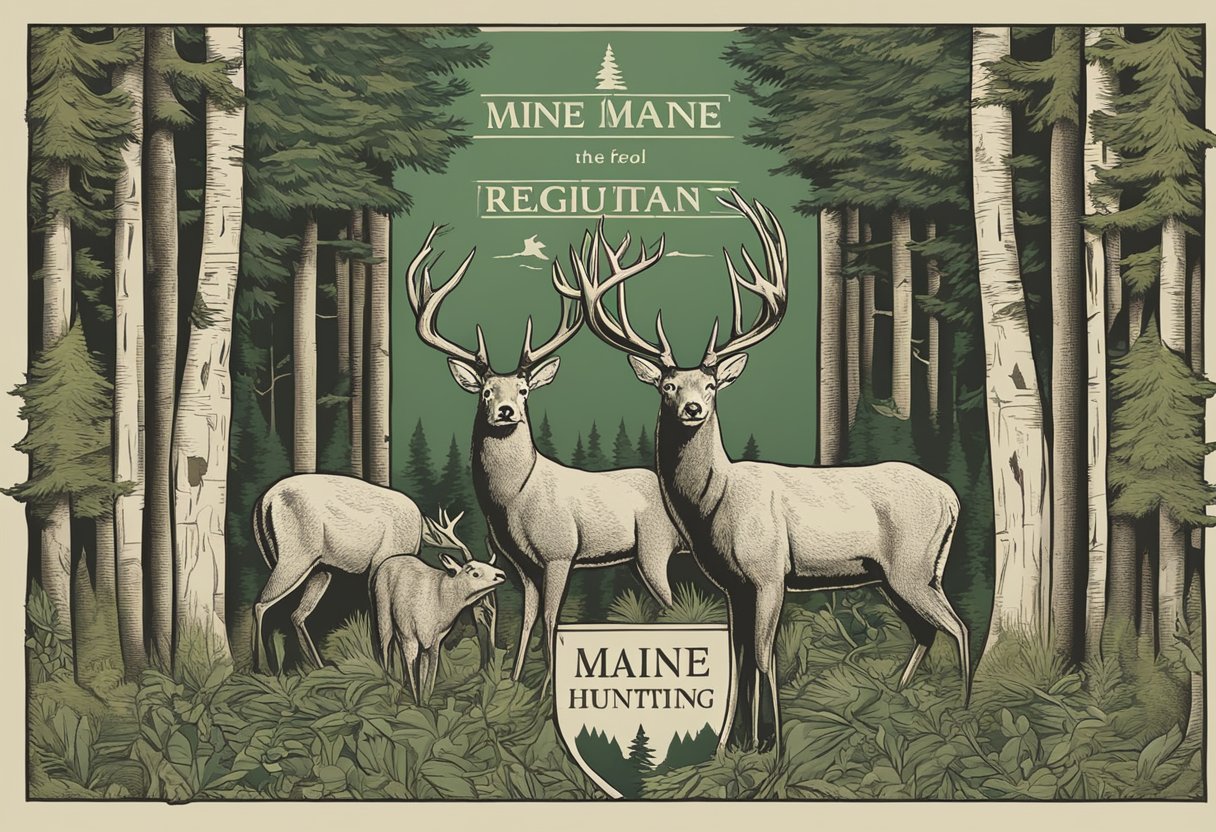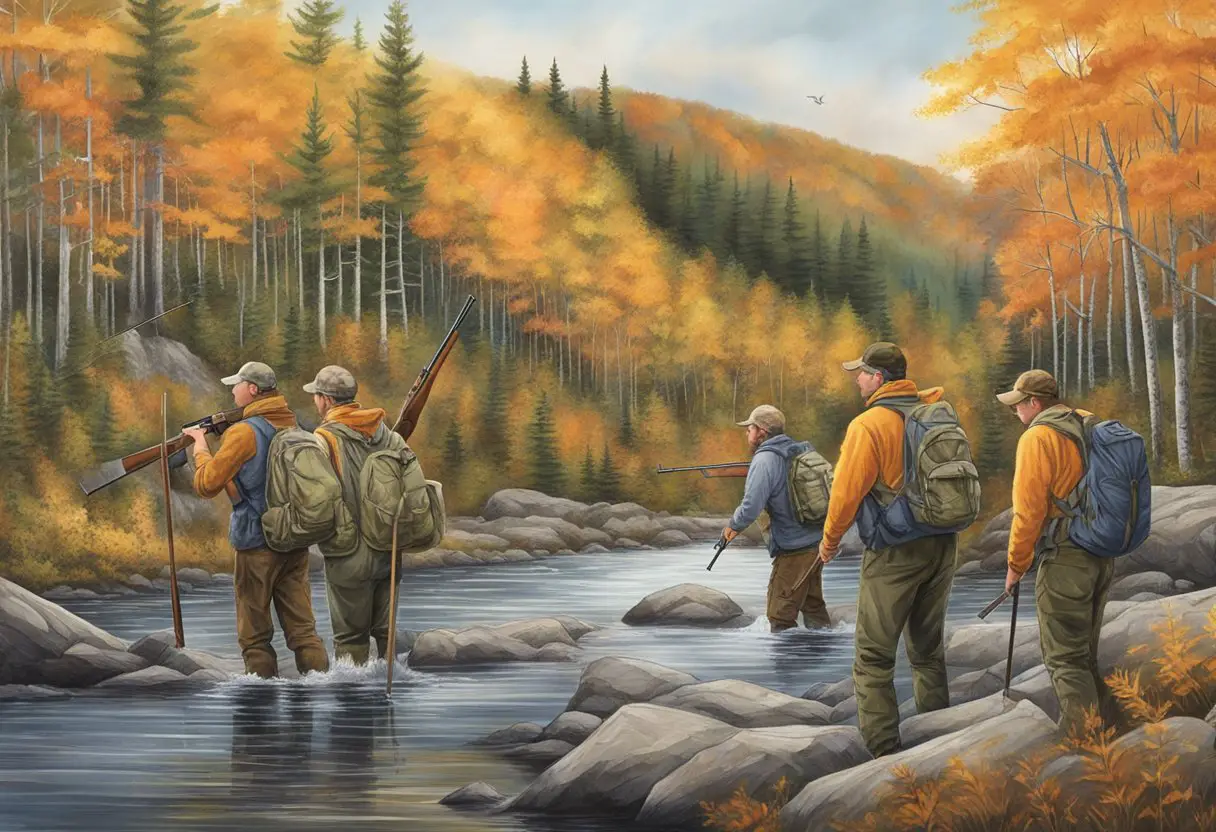Maine boasts a rich tradition of hunting, attracting enthusiasts eager to explore the state’s diverse habitats. Navigating the extensive range of Maine hunting regulations is essential for both resident and nonresident hunters to ensure a safe and legal hunting experience. These laws govern various aspects such as season dates, bag limits, and the use of hunting equipment.
For the most up-to-date information, see this.

A comprehensive understanding of the rules is imperative, especially considering that regulations may differ for various species such as deer, bear, and wild turkey. For example, rules for hunting with dogs are specific and detailed. Equally important are the permits and licenses that hunters must obtain, which delineate legal hunting methods and manage conservation efforts. Hunters are also encouraged to participate in special programs and to educate themselves on ethical hunting practices to support wildlife management.
Key Takeaways
- Hunting regulations in Maine are detailed and vary by species and hunting method.
- Licenses and permits are crucial for legal hunting and wildlife conservation.
- Ethical hunting practices and education are promoted for sustainable hunting.
Table of Contents
General Maine Hunting Regulations
Maine’s hunting regulations are designed to ensure the sustainability of wildlife populations, promote safe hunting practices, and provide a fair chance for all hunters. Whether you are a resident or a nonresident hunter, understanding and adhering to these regulations is mandatory.
Licensing and Permits
All hunters must possess a valid hunting license, which varies depending on residency status and age. Resident hunters can opt for annual or lifetime licenses, while nonresidents may purchase short-term or season-specific licenses. Junior hunters often qualify for reduced fees, and the super pack license is available to residents for multiple activities. Certain species like deer, moose, and turkeys may require additional permits or tags; some of these are allocated through a lottery system.
Seasons and Dates
Hunting season dates are set each calendar year and specify when it is legal to pursue certain game. These dates are crucial in planning your hunting activities and vary by species. For instance, the firearms season for deer may have different timings compared to the muzzleloader or archery seasons.
Hunting Areas and Wildlife Management Districts
Maine is divided into multiple Wildlife Management Districts (WMDs), each with its own rules for hunting. Designated areas, including specific wildlife sanctuaries such as the Cape Elizabeth Sanctuary, are off-limits for hunting. It is imperative to consult a map of the hunting areas and WMDs before planning your hunting trip.
Bag Limits and Tagging
Bag limits are enforced to maintain animal populations and must be strictly followed. Hunters need to have the correct tags and are required to tag their harvest immediately. Regulations for tagging vary, with unique requirements for certain species like the antlerless deer permits.
Equipment and Methods
Maine allows various hunting equipment and methods, including bow and arrow, crossbow, and firearms. The definition of archery equipment has been updated, and the use of traps is strictly regulated. Hunters should ensure they have the proper permits, such as a muzzleloader permit, if they choose to use specialized equipment.
Safety and Legal Considerations
Hunters must complete mandatory safety courses, with specific requirements outlined by the state. Adhering to hunting laws is vital, as infractions can have serious consequences. This includes prohibitions on hunting under the influence and civil trespass with a hunting dog. It is the responsibility of all hunters to stay informed about the current general hunting laws to ensure a safe hunting experience for everyone involved.
Species-Specific Regulations

In Maine, hunting regulations are tailored to manage populations and ensure sustainability of wildlife. Regulations vary across different species, seasons, and designated Wildlife Management Districts (WMDs). Hunters are required to comply with permit stipulations, season dates, and bag limits.
Deer Hunting
The Maine Department of Inland Fisheries & Wildlife governs deer hunting, putting forth specific regulations for various seasons including the expanded archery season, which allows for additional opportunities in designated areas. Regular firearm, archery, and muzzleloader seasons have designated timeframes within which hunters can pursue antlered deer. Special antlerless deer permits are also issued to manage the population.
Youth Deer Hunt Day presents a unique opportunity where junior hunters can participate, with regulations allowing the harvest of one antlered deer. Details on deer hunting provide comprehensive information for each season and district.
Moose Hunting
Maine’s moose hunting is strictly regulated through a permit lottery system, with specific seasons set for moose hunting. Hunters can find their designated WMDs and understand the restrictions on antlered moose and antlerless moose harvesting. The state publishes quotas and seasons annually to ensure a balanced moose population while providing hunting opportunities.
Bear Hunting
Bear hunting in Maine includes methods such as baiting, trapping, and still-hunting. Specific rules apply for bear bait sites and the timing of baiting. For bear trapping, it is imperative to follow the dates and limitations imposed. Submission of a bear tooth is a requirement for biological data collection. Information on bear hunting clarifies allowed practices and seasons.
Turkey Hunting
Maine offers both spring and fall seasons for wild turkey hunting. In spring, hunters pursue bearded turkeys, while the fall season opens opportunities for either-sex turkey hunting. Bag limits and legal hunting methods are detailed for each season. Knowledge of specific regulations for the respective WMDs where turkey hunting is allowed is crucial.
Small Game and Furbearers
The hunting of small game such as ruffed grouse, bobwhite quail, skunk, opossum, gray squirrel, and red squirrel requires awareness of the season dates, bag limits, and WMD zones. Furbearer species, including bobcat and raccoon, have clearly defined trapping and hunting regulations. Hunters need to review regulations with respect to tagging, especially for species like bobcat hunting.
Waterfowl and Migratory Birds
Maine mandates adherence to federal frameworks for waterfowl and migratory game birds hunting. These include ducks, geese, and woodcock. Hunters must ensure they have both state and federal waterfowl stamps, abide by bag limits, and follow shooting hours. The state’s guidelines complement federal regulations to maintain the sustainability of migratory waterfowl populations.
Special Hunting Programs

Maine offers specific hunting programs to accommodate diverse groups of hunters, such as youth, those with disabilities, and beginners. These programs provide additional opportunities beyond the standard hunting regulations, some requiring special permits and adherence to designated zone restrictions.
Expanded Archery Zones
In certain designated areas, hunters can take advantage of the expanded archery season. This special season allows additional deer hunting opportunities in areas with higher deer populations. To participate, hunters must obtain an expanded archery permit in addition to their standard hunting license.
Junior Hunting Opportunities
Maine encourages young hunters to engage in the sport through junior hunting opportunities. Licensed junior hunters, typically under 16 years of age, can utilize special days dedicated to youth hunting. Participation in these days may be subject to specific regulations and supervisory requirements.
Hunting for Disabled Hunters
The state has made provisions for hunters with disabilities through designated hunting areas and modified regulations to increase accessibility. Disabled hunters may be eligible for permits that allow hunting from a stationary vehicle and other accommodations.
Apprentice Program and Complimentary Licenses
For beginners, Maine’s apprentice program is an excellent way for novices to learn hunting skills under the mentorship of experienced hunters. In this program, an apprentice can hunt without a standard license for a certain period. Additionally, Maine provides complimentary licenses to qualifying individuals, such as disabled veterans or those with other specific designations.
Hunting with Dogs
Maine’s hunting regulations stipulate stringent requirements for those who wish to engage in hunting with the assistance of dogs. The rules encompass a range of aspects, from the necessary permits to the specific species that can be legitimately pursued.
Training and Hunting with Dogs
In Maine, before a hunter can set out with their dog to hunt species such as bear, coyote, fox, bobcat, or raccoon, they must be in possession of a valid Dog Training and Hunting permit. This is mandatory for anyone aged 16 or older, whether they are involved in the actual hunting or solely in training their dogs for such activities.
Dog Training Programs
Training programs in Maine are designed to ensure that dogs are well-prepared for hunting pursuits. For effective training, a hunter must adhere to the state regulations, which clearly define the standards and conditions under which the training must be conducted. Compliance with these rules ensures that the dogs are responsibly trained to assist in hunting.
Species Hunted with Dogs
Hunters in Maine commonly use dogs to pursue a variety of game species. Among these are:
- Bear: Utilizing dogs for bear hunting necessitates strategic training and control to handle the challenging nature of this type of hunt.
- Raccoon: Traditionally hunted at night, raccoon hunting with dogs is a time-honored practice.
- Fox: Dogs play a crucial role in tracking and cornering foxes during hunts.
- Snowshoe Hare: Dogs can be particularly effective in snow-covered terrains, assisting in the chase of snowshoe hare.
Each species demands different hunting tactics and thus different training needs for the dogs involved. It is essential that the training aligns with the behavior and environment of the targeted game.
Conservation and Wildlife Management
Maine’s approach to conservation and wildlife management effectively balances the needs of the ecosystem with recreational activities. The strategies in place ensure the sustainability of wildlife populations and their habitats.
Population Management
The Maine Department of Inland Fisheries & Wildlife (MDIFW) employs regulations, such as deer permits and antlerless deer permits, to maintain animal populations at levels that prevent overpopulation and ensure ecological balance. They also issue moose permits through a lottery system to regulate moose numbers within Wildlife Management Districts (WMDs).
Habitat Preservation
Habitat preservation is crucial for wildlife sustenance. MDIFW establishes and enforces rules that protect critical areas, including designating wildlife sanctuaries and managing public and private lands to foster diverse habitats.
Wildlife Research and Monitoring
Regular wildlife research and monitoring are pivotal for informed management decisions. MDIFW conducts studies on various species and their environments, tracking changes and adjusting management strategies accordingly.
Hunter’s Role in Conservation
Hunters support conservation through compliance with MDIFW rules and participation in programs such as Hunters for the Hungry. By doing so, they contribute not only to population control but also to community welfare.
Game Consumption Advisory
The MDIFW provides a game consumption advisory to inform the public about safe consumption levels of wild game. This advice is based on rigorous research to ensure the health and safety of those consuming game meat.
Legal and Ethical Hunting
In Maine, adhering to legal and ethical standards in hunting practices is crucial for conservation, maintaining balance in the ecosystem, and respecting the rights of property owners and other outdoor enthusiasts.
Hunting Laws and Ethics
Maine’s hunting laws establish clear guidelines for hunters, including the requirement for hunting licenses and completion of safety courses. Law compliance ensures humane treatment of wildlife and the sustainability of hunting seasons for future generations.
- Licensing: All hunters must obtain the proper licenses, such as a trapping license if trapping is involved.
- Ethics: Ethical hunting includes fair chase principles and respecting wildlife populations.
Reporting and Compliance
Compliance with hunting regulations is mandatory, and hunters can report any game law violations anonymously via the Alert Us line. Tags and reporting are crucial for game management.
- Tagging: After a successful hunt, animals should be appropriately tagged following Maine’s tagging procedures.
- Education: Hunters are encouraged to take part in safety courses to be well-versed in safe and compliant hunting practices.
Landowner Relations
Hunters are expected to maintain respectful interactions with landowners, securing permission when necessary and avoiding civil trespass. Civil trespass charges can arise from misusing hunting dogs on private property without consent. Obtaining permission helps maintain access for future hunting opportunities.
- Permission: Always seek permission before hunting on private lands.
- Respect: Respect landowner requests and property; leave no trace of your visit.
Hunting Violations
Violations, such as hunting under the influence or illegal practices, are taken seriously and can lead to severe penalties. Maine enforces its general hunting laws to protect both the wildlife and the interests of the public.
- Violence: Strict enforcement against hunting-related violence ensures hunter safety.
- Compliance: Adhering to hunting regulations, such as the use of archery equipment, helps avoid violations.
By observing Maine’s comprehensive hunting regulations, hunters contribute to the tradition of ethical and sustainable wildlife management.
Educational Resources and Support
Maine provides a wealth of resources and support for hunters, ranging from mandatory hunter education courses to comprehensive guides on state regulations. These programs are designed to ensure hunters are well-informed and practice safe hunting.
Hunter Education Courses
Maine mandates that hunters complete a Firearms Hunter Safety course to be eligible for a firearm hunting license if they cannot show proof of a previous adult hunting license. The Bureau of Parks and Lands (BPL) assists by offering several educational programs, including safety courses that cover important regulations and ethical practices.
Hunting Guides and Outfitting Services
For practical, on-the-ground assistance, hunting guides and outfitting services provide hands-on educational opportunities. Not only do these professionals aid in planning and facilitating hunts, but they also reinforce safe hunting practices and adherence to Maine’s hunting laws, ensuring a well-regulated experience.
Conservation Organizations and Partnerships
Conservation organizations work in concert with agencies like the Maine Department of Inland Fisheries and Wildlife (MDIFW), supporting sustainable hunting practices. These groups often participate in programs aimed at habitat protection, wildlife management, and educational outreach, which contribute to the maintenance of Maine’s natural resources and hunting heritage.
Frequently Asked Questions

Maine’s hunting regulations ensure sustainable wildlife populations and fair practices are upheld for the hunting community. Here, we address some of the most common inquiries about the state’s hunting guidelines.
What are the requirements for obtaining a hunting license in Maine?
Individuals must have a valid hunting license to hunt in Maine. Requirements vary by age, residency, and hunting methods.
How can you identify the different hunting zones within Maine?
Hunting zones in Maine are delineated to manage wildlife effectively. Hunters can refer to the Maine Hunting Quick Reference Guide for detailed maps.
What are the legal hunting hours during the hunting season in Maine?
Legal hunting hours in Maine span from half an hour before sunrise to half an hour after sunset. Notable exceptions exist for certain game like migratory birds.
What species are included in Maine’s bird hunting seasons?
Maine’s bird hunting seasons cover a variety of species, which include but are not limited to ducks, geese, and turkeys. Detailed season dates and regulations are available in the state’s hunting publications.
Are there specific regulations for moose hunting in Maine?
Moose hunting in Maine is regulated through a permit system and specific zones and seasons. Hunters should consult the state’s resources for the most current moose hunting regulations.
What are the rules regarding baiting deer on private property in Maine?
Maine has strict rules on baiting deer, generally prohibiting the practice except under certain conditions and times of the year. Hunters can find the exact regulations on the Maine hunting laws webpage.